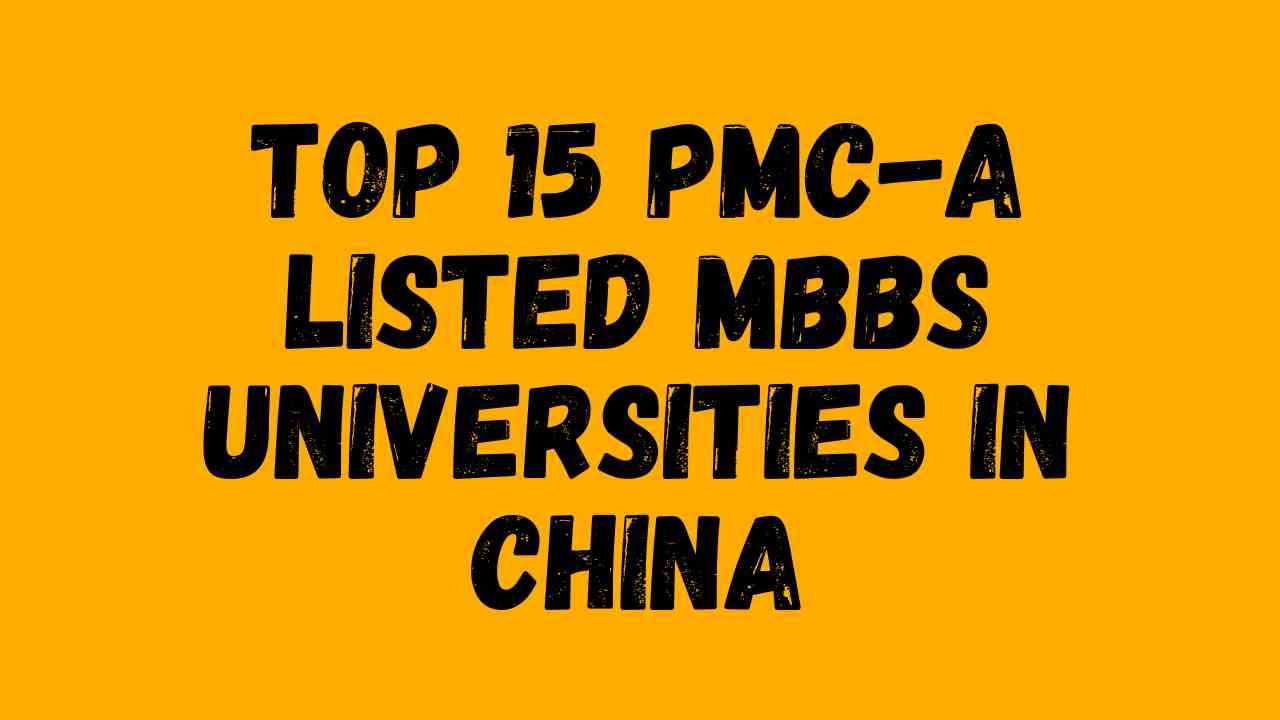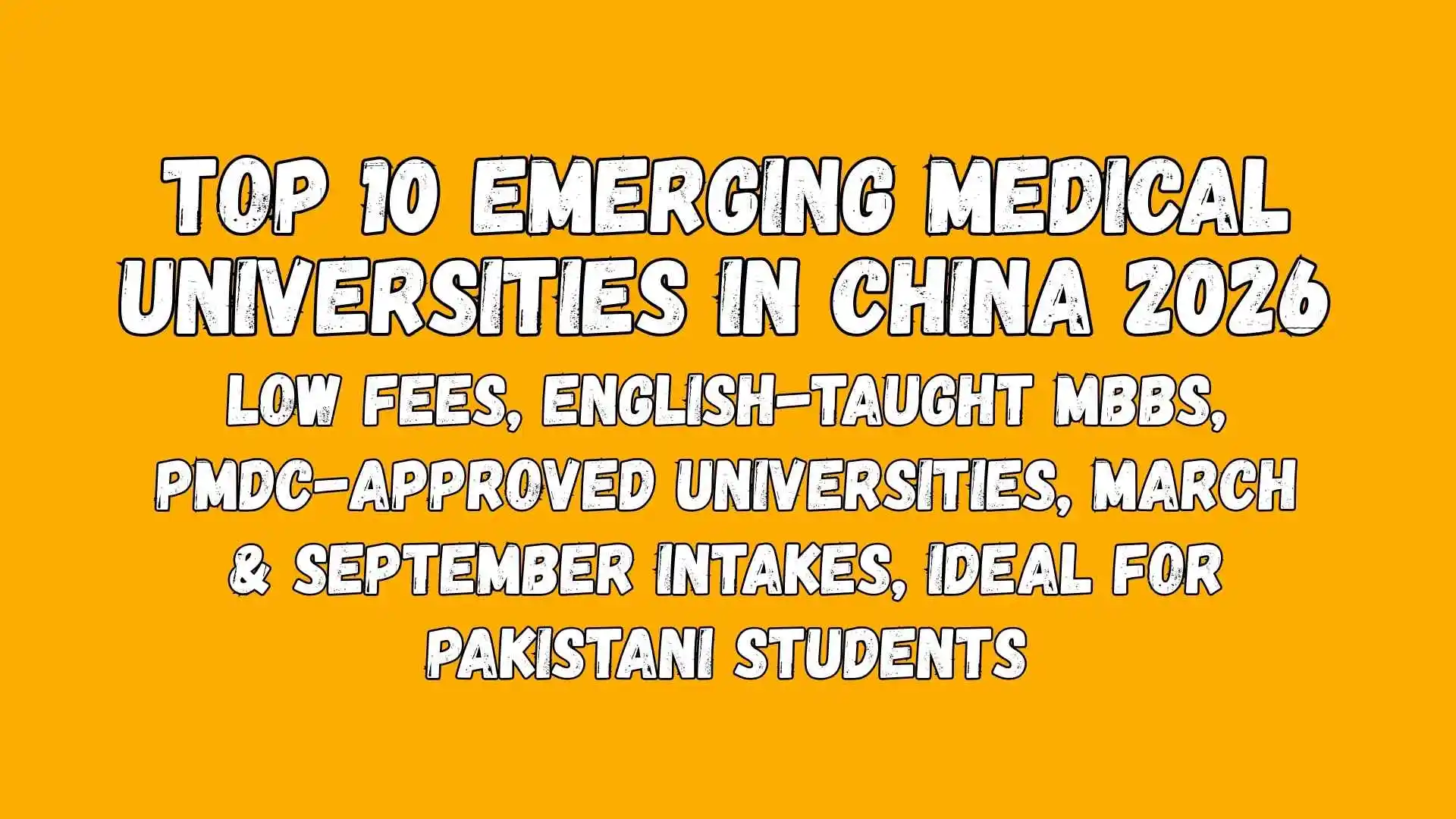Requirements for Pursuing MBBS in China for Pakistani Students (March 2026 Intake)
Home > Requirements for Pursuing MBBS in China for Pakistani Students (March 2026 Intake)

China has emerged as a top destination for MBBS in 2025 for Pakistani students seeking quality medical education abroad. Offering affordable tuition, English-medium programs, modern infrastructure, and globally recognized degrees, Chinese medical universities provide an excellent platform for aspiring doctors. The March 2025 intake is especially important, as early applications secure seats in PMC-approved universities, ensure smooth visa processing, and allow students to plan finances and accommodation efficiently. Understanding MBBS in China requirements for Pakistani students, eligibility criteria, documents, fee structure, and scholarships is essential to avoid delays and maximize opportunities. Soft Consultants guides students through this entire process professionally.
Why Choose MBBS in China for the 2025 Intake?
1. Affordable Tuition and Living Costs
Studying MBBS in China offers a cost-effective alternative to Western medical schools. The total annual cost, including tuition and accommodation, ranges from 20,000 to 35,000 RMB (approximately ₨8–9 lakh PKR), depending on the university and medium of instruction.
- Tuition Fees: Typically between $3,000 and $5,000 USD per year.
- Hostel Charges: Approximately $500 to $1,000 USD annually.
- Living Expenses: Around $150 to $250 USD per month, covering food, transportation, and personal expenses.
These costs are significantly lower compared to medical education in countries like the UK or the USA, making China an attractive destination for Pakistani students seeking quality education at an affordable price.
2. PMC-Approved Universities
The Pakistan Medical Commission (PMC) recognizes several Chinese medical universities, ensuring that graduates are eligible to practice medicine in Pakistan after passing the National Licensing Exam (NLE). Some of the approved institutions include:
- China Medical University
- Jilin Medical University
- Hubei Polytechnic University
Graduating from these recognized universities allows students to pursue medical careers in Pakistan without additional hurdles.
3. English-Medium Programs
China offers English-medium MBBS programs, eliminating the need for proficiency in Mandarin. This is particularly beneficial for international students, including Pakistanis, as it allows them to focus on their medical studies without language barriers. As of the latest data, 44 universities in China are authorized to teach MBBS in English, providing a wide range of options for prospective students.
4. Chinese Government Scholarships
The Chinese government provides various scholarships to international students, covering tuition fees, accommodation, and living expenses. These scholarships are awarded based on academic merit and other criteria, offering significant financial relief to deserving students. For instance, the Chinese Government Scholarship is a fully funded program that includes:
- Tuition Fee Waiver
- Accommodation Allowance
- Monthly Stipend for Living Expenses
Applying for these scholarships can substantially reduce the overall cost of education in China.
5. High-Quality Medical Education
Chinese medical universities are known for their robust medical programs, modern infrastructure, and affiliations with teaching hospitals. Students gain hands-on experience through clinical internships, preparing them for real-world medical practice. The curriculum is designed to meet international standards, ensuring that graduates are well-equipped to pursue medical careers globally.
6. Large Pakistani Student Community
China hosts a significant number of Pakistani students, fostering a supportive community. This presence not only provides cultural familiarity but also creates a network of peers who can offer guidance and assistance throughout the academic journey. The established Pakistani student associations in various Chinese cities organize events, cultural activities, and support systems, enhancing the overall student experience.
Eligibility Criteria for MBBS in China (Pakistani Students 2025)
China has become one of the most preferred destinations for Pakistani students who want to study MBBS abroad. Its affordable tuition fees, globally recognized medical degrees, English-medium programs, and safe environment make it a top choice for aspiring doctors. Chinese medical universities are recognized by the PMC, WHO, and UNESCO, which means the degree is valid not only in Pakistan but worldwide. To apply successfully, students must meet specific eligibility criteria.
1. Academic Qualifications
Students must have completed FSc Pre-Medical from a recognized board in Pakistan or equivalent qualifications, such as A-Levels with subjects Biology, Chemistry, and Physics.
Most universities require a minimum of 50–60% marks in science subjects. Some top-tier universities may require slightly higher scores.
Studying English as a subject is recommended, as MBBS programs in China are taught in English.
2. Age Requirement
Students should generally be between 17 and 25 years old. Some universities may allow students slightly above 25 with special approval.
3. Language Proficiency
MBBS courses in China are offered entirely in English, so fluency in Chinese is not required. Learning basic Mandarin is beneficial for daily communication, cultural adaptation, and hospital internships.
4. Health and Medical Fitness
Applicants must submit a medical fitness certificate issued by a certified doctor. Students must be free from serious health conditions or contagious diseases.
5. Admission Tests and Competitive Exams
Most Chinese universities do not require competitive entrance exams for international students. Universities may assess the applicant’s academic records and verify documents for eligibility. This makes admission simpler and faster compared to competitive medical colleges in Pakistan.
6. Required Documents
- FSc/A-Level certificates and transcripts
- Passport copy with at least 18 months' validity
- Passport-size photographs
- Medical fitness certificate
- Application form and recommendation letters if required
7. Additional Considerations
Some universities may have scholarship options for meritorious students. Pakistani students are encouraged to join universities with active student communities, especially those with senior Pakistani students, for guidance and cultural support.
📑 Documents Required for MBBS in China (Pakistan 2025)
Applying for MBBS in China requires Pakistani students to prepare a set of verified and attested documents. Proper documentation ensures smooth processing of applications, university admissions, visa approvals, and compliance with Pakistan Medical Commission (PMC) regulations.
1. Academic Certificates
- FSc Pre-Medical or A-Level Certificates and Transcripts
Verified proof of completion of higher secondary education with Physics, Chemistry, and Biology.
Must meet the minimum percentage requirement (50–60% or as per university criteria). - High School Certificates (Matriculation/O-Level)
Demonstrates foundational education and eligibility for FSc or A-Level studies.
2. Passport and Identification
- Valid Passport Copy
Minimum 6 months validity at the time of admission and visa application. - Passport-Size Photographs
Recent photos with clear background, as per university and visa specifications.
3. PMC/MDCAT Documents
- MDCAT Result
Mandatory for Pakistani students to ensure recognition of MBBS degrees in Pakistan. - PMC Eligibility Certificate (if already issued)
Confirms that the student is eligible to pursue medical education abroad.
4. Health & Medical Certificates
- Medical Fitness Certificate
Confirms the student is physically and mentally fit to pursue a demanding MBBS program. - Medical Test Reports
HIV, Hepatitis B/C, TB screening, vision, and hearing tests. - Vaccination Record
Some universities require proof of routine immunizations.
5. English Language Proof (for English-Medium Programs)
- High School English Marks
Satisfies the minimum English proficiency requirement. - Optional English Tests
IELTS or TOEFL scores may be submitted if required by the university.
6. Additional Documents
- Recommendation Letters (if required)
Academic or professional references highlighting student’s suitability for medical studies. - Statement of Purpose / Personal Statement (if required)
Explains motivation for studying MBBS in China and future career plans. - Application Form of University
Completed accurately and signed as per guidelines.
7. Attestation & Verification
- All academic certificates and health documents should be attested by the Ministry of Education, HEC, or relevant authorities in Pakistan.
- Translations into English or Chinese may be required if original documents are in Urdu.
💰 MBBS Fee Structure in China for Pakistani Students (2025 Intake)
Pursuing MBBS in China is increasingly becoming the preferred choice for Pakistani students due to its affordable tuition, globally recognized degrees, modern infrastructure, and high-quality education. Understanding the complete fee structure helps families plan their finances effectively and ensures transparency before enrollment.
1. Tuition Fees
- The tuition fee for MBBS programs in China generally ranges from $4,000 to $7,000 per year, depending on the university and city.
- For the complete 5–6-year MBBS program, the total tuition cost typically falls between $24,000 and $42,000.
- Some universities provide merit-based scholarships or early admission discounts, which can significantly reduce overall tuition.
2. Accommodation Costs
- On-Campus Housing: Most universities offer fully furnished hostels with Wi-Fi, shared kitchens, and laundry. Annual cost: $800 – $1,500.
- Off-Campus Housing: Private apartments or shared accommodations may cost $1,000 – $2,500 per year, depending on the city.
- Shared accommodation reduces costs and helps international students integrate socially.
3. Food and Living Expenses
- Monthly expenses for meals, groceries, and personal items are approximately $150 – $250.
- The annual living cost therefore ranges from $1,800 – $3,000.
- Costs may vary depending on lifestyle choices and city; larger metropolitan areas such as Beijing, Shanghai, or Guangzhou are slightly more expensive.
4. Health & Insurance
- Mandatory Health Insurance: All international students are required to have health insurance, typically costing $100 – $200 per year.
- Covers hospitalization, checkups, and emergency medical treatment, ensuring student safety and compliance with Chinese regulations.
5. Academic Materials and Miscellaneous
- Books and Study Materials: Around $100 – $200 per year.
- Visa & Travel: Student visa fees $100 – $150; airfare from Pakistan to China $400 – $700.
- Miscellaneous: Transport, stationery, personal care, and daily expenses may cost $50 – $100 per month.
6. Scholarships & Financial Assistance
- Chinese Government Scholarships (CSC)
- University-specific merit scholarships
- Confucius Institute or local government scholarships
- These can cover tuition, accommodation, and sometimes living expenses, reducing financial burden.
7. Estimated Annual Budget Summary
| Category | Approximate Annual Cost (USD) |
|---|---|
| Tuition Fees | $4,000 – $7,000 |
| Accommodation | $800 – $1,500 |
| Food & Living Expenses | $1,800 – $3,000 |
| Health Insurance | $100 – $200 |
| Books & Miscellaneous | $200 – $500 |
| Total Estimated Annual Cost | $6,900 – $12,200 |

Top 15 PMC-A Listed MBBS Universities in China
Choosing the right university is the first step toward a successful MBBS journey in China. Here are the top PMC-A approved universities trusted by Pakistani students for their high-quality education, affordable tuition, and excellent facilities.
Nanchang University
Location: Nanchang, Jiangxi Province
Tuition Fees: $4,500–$5,500 per year
Program: 6-year MBBS in English
Highlights: Modern facilities, experienced faculty, and a multicultural environment
Dalian Medical University
Location: Dalian, Liaoning Province
Tuition Fees: Around $5,000 per year
Program: 6-year MBBS in English
Highlights: Strong emphasis on clinical training and research opportunities
Qingdao University
Location: Qingdao, Shandong Province
Tuition Fees: $5,000 per year
Program: 6-year MBBS in English
Highlights: Diverse international student community and modern medical facilities
China Medical University
Location: Shenyang, Liaoning Province
Tuition Fees: $5,000 per year
Program: 6-year MBBS in English
Highlights: One of China's oldest medical universities with a strong academic reputation
Shihezi University
Location: Shihezi, Xinjiang Province
Tuition Fees: $4,500 per year
Program: 6-year MBBS in English
Highlights: Pioneer in MBBS in English since 2002, with a large number of international students
Ningxia Medical University
Location: Yinchuan, Ningxia Hui Autonomous Region
Tuition Fees: $4,800 per year
Program: 6-year MBBS in English
Highlights: High success rate in licensing exams
Nanjing Medical University
Location: Nanjing, Jiangsu Province
Tuition Fees: $5,000 per year
Program: 6-year MBBS in English
Highlights: Strong clinical training and research
Jiangsu University
Location: Zhenjiang, Jiangsu Province
Tuition Fees: $5,000 per year
Program: 6-year MBBS in English
Highlights: Modern infrastructure and expert faculty
Zhengzhou University
Location: Zhengzhou, Henan Province
Tuition Fees: $5,200 per year
Program: 6-year MBBS in English
Highlights: Comprehensive curriculum and research opportunities
Guangzhou Medical University
Location: Guangzhou, Guangdong Province
Tuition Fees: $5,000 per year
Program: 6-year MBBS in English
Highlights: International student community with modern facilities
Peking University
Location: Beijing
Tuition Fees: $4,500 per year
Program: 6-year MBBS in English
Highlights: One of China's top universities with a strong medical program
Xi’an Jiaotong University
Location: Xi’an, Shaanxi Province
Tuition Fees: $5,500 per year
Program: 6-year MBBS in English
Highlights: Known for research and clinical excellence
Harbin Medical University
Location: Harbin, Heilongjiang Province
Tuition Fees: $5,000 per year
Program: 6-year MBBS in English
Highlights: Emphasis on clinical training and research
Jilin Medical University (Beihua University)
Location: Jilin City, Jilin Province
Tuition Fees: $4,800 per year
Program: 6-year MBBS in English
Highlights: High success rate in international licensing exams
Shandong University
Location: Jinan, Shandong Province
Tuition Fees: $5,200 per year
Program: 6-year MBBS in English
Highlights: Comprehensive curriculum and strong research opportunities
MBBS Admission Process in China – Step by Step (2025)
Pakistani students planning to study MBBS in China for the March 2025 intake should follow these clear steps. A systematic admission process ensures smooth enrollment, visa approval, and settlement in China.
1. Choose a PMC-Approved University
Select a university from the official PMC A-list to ensure your MBBS degree will be recognized in Pakistan. Compare tuition fees, city, hostel facilities, English-medium programs, and overall reputation before finalizing.
2. Check Eligibility
You must have completed F.Sc (Pre-Medical) or equivalent with at least 60% marks. Age limit is usually between 16–26 years. IELTS/TOEFL are not required for most universities, but a NEET score may be necessary for PMC recognition.
3. Prepare Required Documents
Get your documents attested, including a valid passport (18+ months), academic transcripts, NEET score (if required), medical fitness certificate, passport-sized photos, and a police clearance certificate. Keep original and attested copies ready.
4. Apply Online
Submit your application through the university’s portal or via an authorized consultant. Fill all details correctly, upload required documents, and pay the application fee before the deadline.
5. Receive Admission Letter
Once accepted, you’ll get an official Admission Letter. This document is required for both your visa application and university registration after arriving in China.
6. Apply for a Chinese Student Visa
With your Admission Letter, apply for a Chinese Student Visa (X1 or X2). Submit your passport, Admission Letter, photographs, medical report, and visa form to the Chinese Embassy.
7. Arrange Travel & Accommodation
Book your flight early and confirm accommodation in the university hostel or private housing. Keep the university’s address and contact details handy for immigration and travel purposes.
Common Mistakes Pakistani Students Make
1. Not Verifying PMC Approval: Choosing non-PMC universities leads to non-recognized degrees in Pakistan.
2. Applying Late: Delayed applications mean missing March/September intakes.
3. Submitting Incomplete Documents: Missing attested transcripts or medical certificates causes rejection.
4. Ignoring Living Costs: Budgeting only for tuition and ignoring food, transport, and housing creates financial stress.
How Soft Consultants Help Pakistani Students
1. Personalized Counseling: One-on-one sessions to choose the right PMC-approved university.
2. Direct University Admission: Complete application submission without errors for guaranteed admission chances.
3. Visa Guidance & Documentation: Step-by-step assistance with Admission Letter, passport, medical certificates, and visa form.
4. Scholarship Assistance: Support in applying for CSC and university scholarships to reduce costs.
5. On-Ground Support: Help with hostel check-in, registration, and orientation upon arrival in China.
Conclusion
Applying early for the March 2025 intake is the smartest move for Pakistani students. With affordable tuition, English-medium MBBS programs, excellent clinical exposure, and degrees recognized globally, China is the top choice for medical studies.
Soft Consultants ensures a smooth journey from admission to arrival. Take the first step toward your medical career today!
🚀 Apply Now – MBBS in China (March 2025 Intake)Apply Now
Table of Contents
-
 17 Jan 2026 UncategorizedStudent Life in China for Pakistani Students 2026 Guide
17 Jan 2026 UncategorizedStudent Life in China for Pakistani Students 2026 Guide -
15 Jan 2026 UncategorizedTop Masters in Turkey STEM Programs 2026 with Scholarships
-
14 Jan 2026 UncategorizedChinese MBBS Degree Recognition in Europe, Gulf & Middle East (2026)
-
13 Jan 2026 UncategorizedStudent Accommodation in China for MBBS/BDS: Costs, Cities & Tips 2026
-
12 Jan 2026 UncategorizedTop Turkish Universities Accepting Students Without IELTS/TOEFL (2026)
-
09 Jan 2026 UncategorizedEmerging Medical Universities in China 2026 – Low Fee MBBS for Pakistanis
-
08 Jan 2026 UncategorizedMBBS in China March 2026 Intake | Complete Guide for Pakistani Students
-
07 Jan 2026 UncategorizedGap Year Strategy 2026 for Pakistani Students | Study Abroad Guide
-
06 Jan 2026 UncategorizedMBBS & BDS in Kyrgyzstan 2026: Eligibility, Fees & Admission Guide for Pakistanis
-
05 Jan 2026 UncategorizedBDS Abroad with Low Marks or Gap Years | Soft Consultants











